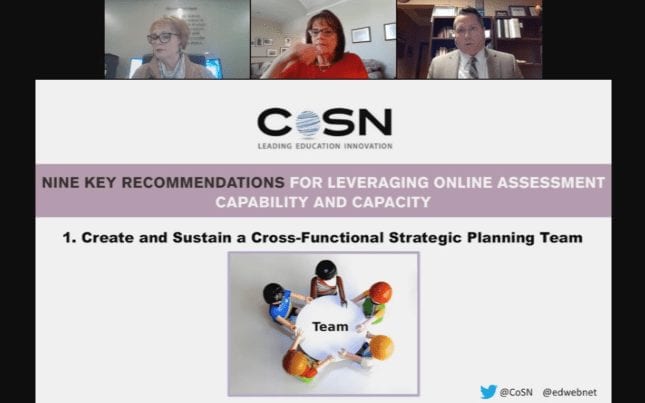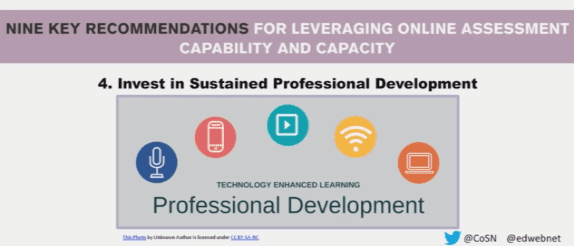Key Questions and Recommendations for Online Assessment
Even in today’s tech-heavy environment, before moving to online assessments, leadership needs to ask: Should we? According to Glenn Robbins, Superintendent of Tabernacle Township School District, NJ, and Dr. Donna Wright, Director of Schools, Wilson County Schools, TN, too often the focus is on why everyone else is doing it or the idea that everything needs to be done on a computer. During their presentation, “Online Assessment: An Evolving Landscape and New Opportunities,” they discussed the lessons they learned when they made the transition and what they would change if they could.
First, Robbins proposed several key questions leaders should ask before even considering online assessments.
– What is the experience we’re trying to create?
– What is our curriculum?
– Where are we going with the curriculum?
– What are we using for assessment right now, why are we using it, and how could it improve?
In other words, leaders need to frame the potential value of online assessments, before tech is even talked about, in the larger context of the curriculum. Wright added that leaders also need to think about how online assessments can impact a school’s culture and change teaching and learning. Most important, the new assessments must fit into the district’s strategic plan—both the overall goals for the school and the financial commitments.
Next, Wright and Robbins shared their perspective on the elements in CoSN’s Nine Key Recommendations for Leveraging Online Assessment Capability and Capacity and how that impacted their transition.
1. Create and Sustain a Cross-Functional Strategic Planning Team: Both Wright and Robbins said their schools had a lot of silos, not just edtech and instruction, that needed to come together and understand how their specific skill sets are necessary to the process. In addition, leaders need to bring parents in early during these conversations. Without support from parents, especially in this era of opting out of testing, the initiative will face significant obstacles.
2. Ensure Ongoing Funding: It’s not just that tech programs aren’t one and done, but that administrators can’t predict some of the future costs. Again, Wright emphasized changing the way leaders think about their funding and building line items for accountability and assessment into the budget.
3. Embed Technology in Instructional Practice: If students are going to be tested with tech, then they need to be learning that way on a regular basis. This means, said Robbins, that principals and superintendents need to understand the realities of home tech access for their students. Do they have reliable Wi-Fi? Do they have a device they can use at home? If not, how can the school help? Finally, school leaders need to model tech use to their teachers and show that the administration is all in on using tech for education.
4. Invest in Sustained Professional Development: The presenters agreed that there are always excuses to limit or avoid PD, especially time and money. But they said that without significant and effective PD, leaders are setting up their teachers to fail.
5. Build and Maintain a Robust Infrastructure: Obviously, if a school is dependent on online assessment, the connections and devices need to work. Before choosing any online assessments, schools need a tech reality check on what their current system can handle and what they can realistically afford, upgrade, and maintain. Most important, the word “done” goes out of the vocabulary.
6. Select Devices Strategically: Basically, devices and programs that work well for second graders might not work for tenth graders. Robbins reminded attendees, though, that the device isn’t as important as students’ abilities to explore them and become comfortable using them. Whatever device students will use in their future careers probably hasn’t been invented yet, so schools should focus on literacy across devices.
7. Communicate Often and Thoroughly: Be transparent, explain what’s happening, but don’t brag, said Robbins. Nothing that happens in school should surprise a family when the child comes home.
8. Consider Logistics: Wright said this goes back to having a solid, overall strategic plan and a specific plan for converting to online assessments.
9. Use Assessment Data Effectively: Leaders shouldn’t rely on teachers knowing how to use and share the data with students and families. Robbins said that his schools make time to talk about the data among the staff, and the teachers are having regular conversations with the kids about what the data means to them. Wright added that part of the conversation is making sure that assessments aren’t viewed as punitive but as tools to show students and families how the child is growing.
In fact, Wright said that the one thing she would do differently is to move more slowly and get the whole school community involved in the transition from the start. “I made some assumptions that everyone would be agreeable and would support the initiative, and that’s simply not the case,” said Wright. “Also be aware of the critics, and make sure that you meet with them and understand what their concerns are because, again, it only takes a few negatives to really disrupt a good practice.”
This edWeb webinar was sponsored by ClassLink and co-hosted by CoSN and edWeb.net
This article was modified and published by eSchool News and EdScoop.
About the Presenters
Glenn Robbins is Superintendent of Tabernacle Township School District in New Jersey. His passion is harnessing a school culture that thrives on design thinking skills, innovative digital spaces, high caliber professional development, exponential thinking, BYOD/1to1, and makerspaces. Glenn encourages all students to have a voice, not only in building a school culture, but also in designing student led courses. He was named as a Digital Principal of the Year by NASSP for exhibiting bold, creative leadership in his drive to harness the potential of new technologies to further learning goals for staff, students, and the school community. Glenn has been recognized by numerous organizations for his innovative technology implementation methods and has been a featured speaker at numerous events across the globe. By empowering students and staff to have a growth mindset through design thinking, while implementing digital tools, we better prepare them for the profound shifts that they will encounter in life.
Dr. Donna Wright began serving as Director of Schools for Wilson County Schools, TN in 2014. Under her guidance, district-wide academic performance has significantly improved; the district is undergoing the largest school building program in the history of the county; a concentrated emphasis on early literacy instruction is a focal point; and college and career readiness is a hallmark in middle and high schools. She has worked in public school education, K-12 and higher ed, for over 36 years. Dr. Wright holds a doctorate in leadership studies from the University of Tennessee, has earned several awards, including the Women of Achievement Award and the UT Educators Hall of Honor Award, has authored several articles in educational publications, and continues to serve as an adjunct professor at various institutions of higher learning.
About the Host
Ann McMullan is a 34-year veteran educator who served as the executive director for educational technology in the Klein Independent School District, located just outside Houston, Texas until September 2013, when she and her family moved to Los Angeles, California. For 16 years Ann led the team in Klein ISD that provided professional development on technology and 21st century instructional strategies to over 4,000 professional educators serving over 50,000 students. During that time Ann also co-chaired the Texas Education Technology Advisory Committee which developed the Texas Education Agency’s Long Range Plan for Technology, 2006-2020.
Today, she is based in Los Angeles, California working as a public speaker, writer, and independent education consultant focused on supporting leadership, visioning and planning to meet the needs of today’s students. She is a frequent presenter at state, national and international education conferences. Ann serves as project director for CoSN’s Empowered Superintendents Program. She serves on the board of PowerMyLearning Los Angeles and on the advisory board of Project Tomorrow. In the fall of 2016 Ann co-authored and published Life Lessons in Leadership: The Way of the Wallaby.
Join the Community
Super-Connected: Empowering Superintendents & District Leaders community is a free professional learning community on edWeb.net for school superintendents, district leadership, and aspiring district leaders.







Comments are closed.